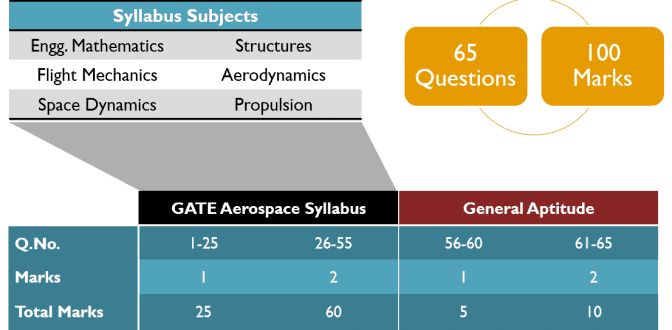GATE Aerospace Online Exam consists of 65 questions carrying 100 Marks.
55 (out of 65) Questions are based on syllabus of GATE Aerospace and carry a total of 85 marks (out of 100). These questions are broadly from the following topics
- Engg. Mathematics
- Flight Mechanics
- Space Dynamics
- Aerodynamics
- Structures
- Propulsion
10 (out of 65) Questions are based on 'General Aptitude' and carry a total of 15 marks (out of 100). These questions are broadly based on
- English
- Logical Reasoning
- Data Interpretation
- Basic Mathematics

Type of Questions
GATE Aerospace contains questions of two different types :
- Multiple Choice Questions (MCQ) carrying 1 or 2 marks each; Each of these questions will contain four answers, of which one correct answer is to be marked;
- Multiple Select Questions (MSQ) carrying 1 or 2 marks each; Each of these questions will contain four answers, of which more than one correct answer is to be marked;
- Numerical Answer questions, where the answer is a number, to be entered by the candidate using the mouse and a virtual keypad that will be provided on the screen.
Marking Scheme
- For 1 mark MCQs, 1/3 mark is deducted for a wrong answer. For 2 marks MCQs, 2/3 mark is deducted for a wrong answer;
- There is no negative marking for numerical answer type questions.
Design of Questions
- Recall: These are based on facts, principles, formulae or laws. The candidate is expected to be able to obtain the answer either from his memory of the subject or at most from a one-line computation.
- Comprehension: These questions test the candidate’s understanding of the basics of the field, by requiring him to draw simple conclusions from fundamental ideas.
- Application: In these questions, the candidate is expected to apply his knowledge either through computation or by logical reasoning.
- Analysis and Synthesis: These can be linked answer questions, where the answer to the first question of the pair is required in order to answer its successor. Or these can be common data questions, in which two questions share the same data but can be solved independently of each other.


Comments are closed